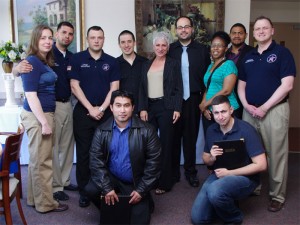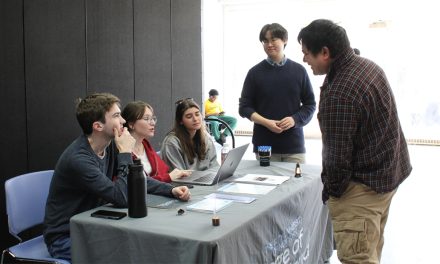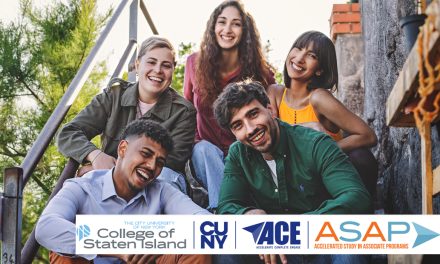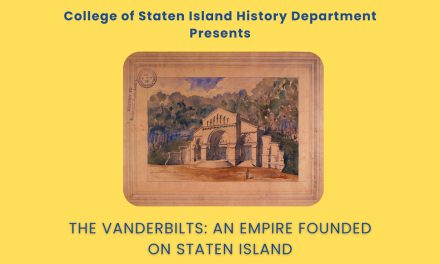The College of Staten Island (CSI) Student Veteran Center recently held its first-ever Veterans Commencement Luncheon in honor of all graduating CSI students who have served in the military.
View the CSI Today Photo Gallery.
Going from the military to student life can be a difficult transition for many returning veterans, but CSI’s Student Veteran Center aims to make the transition a little less jarring by offering expert guidance as soon as they enter the college community.
CSI’s dedication to service has repeatedly earned the college a place on the G.I. Jobs list of “Military Friendly Schools,” which honors the top 20 percent of military-friendly colleges, universities, and trade schools in the nation.
“Within one hour at CSI, Vito Zajda (Certifying Official, Registrar’s Office) took care of everything,” said Ann Little, a CSI student graduating with an MA in History and former soldier in the Army, this summer. “It is this level of support for its veterans that sets CSI apart as a veteran friendly college and the addition of the Veterans Commencement Luncheon is one more step on the long road of helping our veterans re-enlist into civilian life.”
Salvador Mena, Assistant Vice President of Student Affairs welcomed those in attendance and shared, “please know that many others who could not be with us today are here in spirit honoring your service and celebrating your educational achievements.” That sentiment was shared by all in attendance. Military or civilian, those present at the luncheon exhibited a sort of fraternal pride in its graduating class. It was obvious to all that this was a landmark event at CSI.
CSI President Dr. Tomás D. Morales nearly said as much during his opening remarks by congratulating the veterans for “this extraordinary milestone.” He then acknowledged the veterans who worked at the Veterans Center for their “hard work and devotion to their brothers and sisters.”
“CSI offers a very unique level of service,” said Ann Little, who has worked as a college assistant helping her fellow veterans to fully integrate into student life. In fact, the Student Veteran Center keeps up with its student vets throughout their college careers, aiding them every step of the way. It is a level of service that has even changed the career paths of one of the center’s first assistants. “After graduating I want to continue to help veterans in transitioning to civilian life,” said Little.
The veteran’s program at CSI began in 2007 when there were approximately 130 student vets enrolled at CSI—the number has since doubled. The newly formed office dedicated itself to providing a one-stop service where student vets were offered advice on everything from registering to filling out the proper paperwork to simply, but importantly helping them adjust to student life. “Having veterans work in the office was a huge boost to understanding how difficult a transition it is,” said Urszula Echols, Veterans Coordinator at CSI.
According to Echols, veteran students have more life experience than most other students– even than some of their instructors. It is that life experience that can make or break a veteran student. “The vets not only deal with school,” said Echols. “Many of them have families and jobs they need to keep up with as well.” It is this experience that makes veteran students “dependable, serious, and proud students.”
The best validation for any faculty or staff member is experiencing the success of their students and the pride in the room during the luncheon was palpable as the students who had achieved an especially high level of success received awards. David Colon, a retired member of the Coast Guard, was invited as the guest student speaker and he spoke about the opportunities graduating from CSI will afford him. “CSI has really helped understand my life-long goals,” said Colon during his speech. The future MBA student also discussed what makes CSI so successful at accommodating its veteran students. “It was essential that vets were helping other vets,” he explained. He also credited President Morales with allowing veterans to receive credit for their service and experience. “We have a voice here.”

![[gallery] Graduating Vets Honored](https://csitoday.com/wp-content/uploads/2012/05/Veterans_Recognition_Luncheon_5_30_2012.jpg)
















